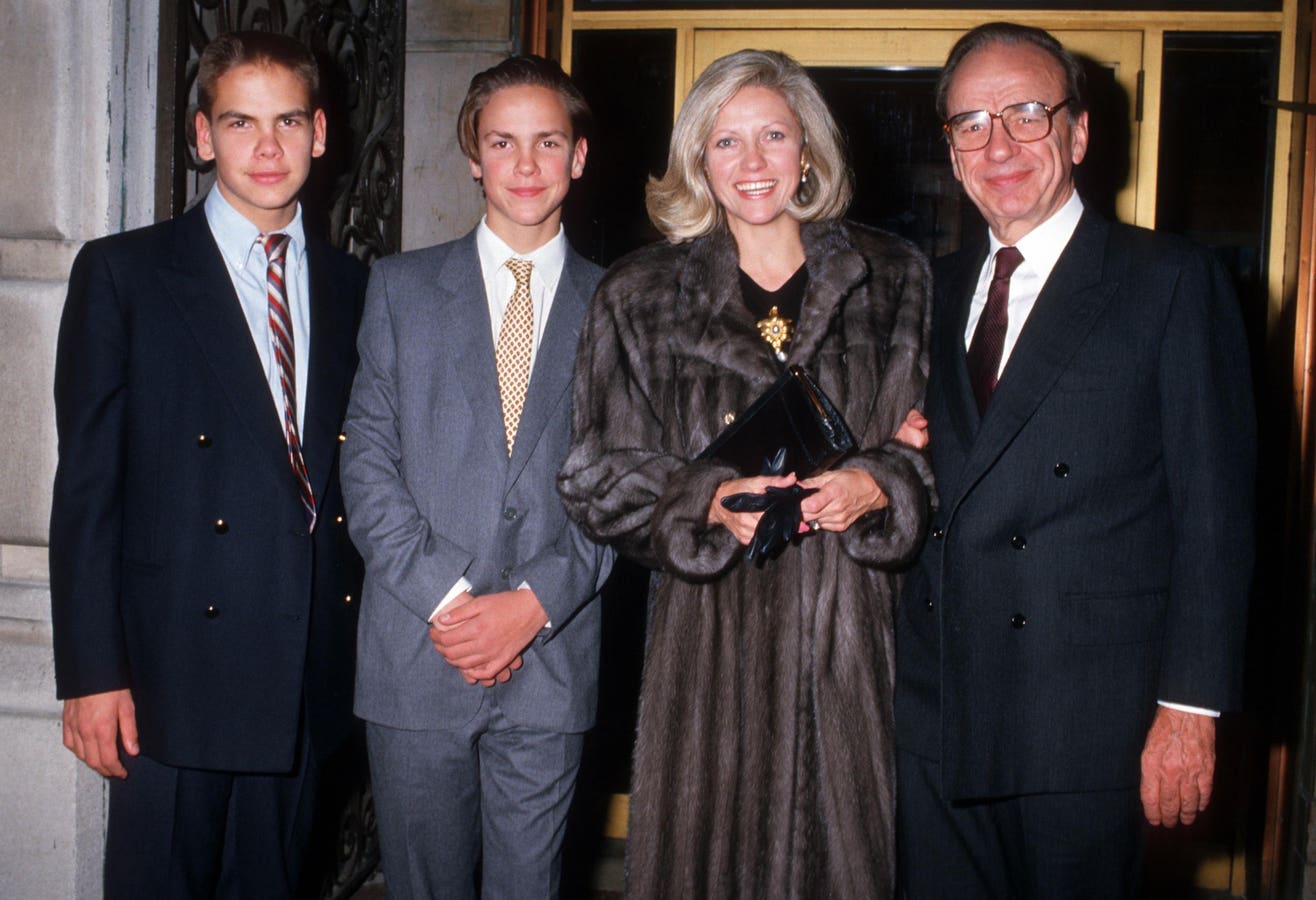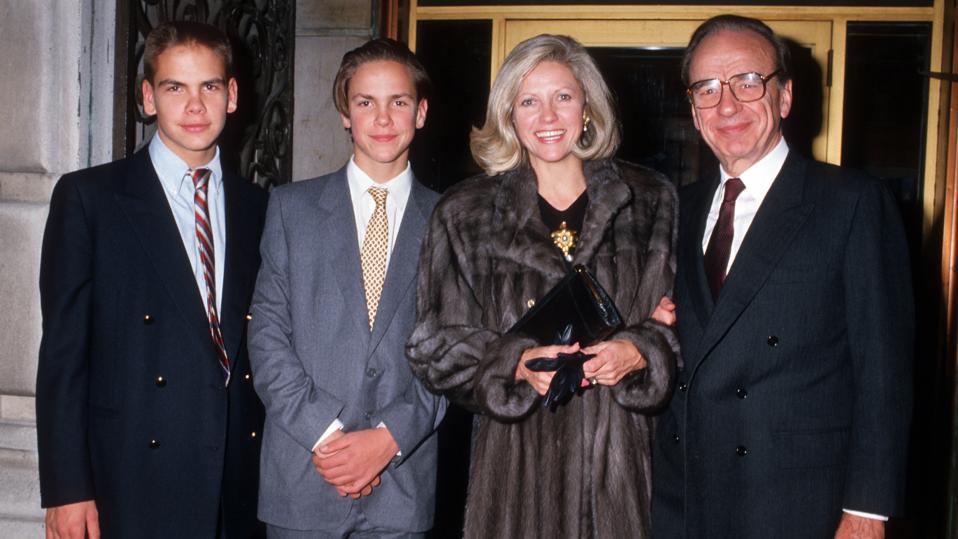The outcome of the succession of Rupert Murdoch wasn’t just a product of business. Here’s a breakdown of the family psychology that underpinned it.
Ron Galella Collection via Getty Images
When Rupert Murdoch, now 94, rewrote his multi-billion-dollar trust this year, he set off shockwaves. And by favoring his eldest son, Lachlan, over his other children, Murdoch handed the world what may just be the closest thing to a real-life version of HBO’s Succession. Only, in the case of the Murdochs, the stakes are much, much higher; the fallout could very well alter the balance of global media power.
That said, Murdoch’s decision wasn’t an all-or-nothing business strategy. From a psychological perspective, this move was highly tactical, but also somewhat predictable. What we, the onlookers, saw was just a culmination of decades of family grooming, favoring and sidelining. But for researchers who study family (and even business) psychology, the Murdochs are a prototypical example of how personal legacies so easily entwine with financial empires.
Here are three things we can learn about the Murdoch succession through the lens of family psychology.
1. Parenting Styles
Parenting and leadership styles often become one and the same within families where immense wealth and power are at stake. And for Rupert Murdoch, the media empire he built from the ground up was so much more than just a business; it’d be more appropriate to call it his legacy. And for any legacy as great as his, it wouldn’t be at all surprising if it permeated into various other aspects of life: economic visions, overall worldviews and even family hierarchies.
By extension of this, it’s plausible to assume that the way in which he parented his children was likely inseparable from the way he managed his business.
A 2017 study of high-achieving young adults published in the Journal of Advanced Academics lends support to this idea, too. Specifically, the study found that authoritarian parenting was strongly associated with a form of perfectionism rooted in external approval. This is what psychologists call socially prescribed perfectionism.
Put simply, this means that children raised by stricter, more demanding parents will be more likely to measure their worth by the extent to which they live up to the expectations imposed on them — rather than by their own standards. More supportive parenting styles, on the other hand, were linked to much healthier, self-driven forms of perfectionism. The implication here is crystal clear. That is, in families that favor authoritarian dynamics, children may be groomed to perform the legacy and ideals of the parent.
Murdoch’s track record suggests a probable tilt toward the authoritarian side; he has long been known for his conservative ideology, his uncompromising expectations and his top-down management style. These qualities too appear to have rippled into his parenting.
Lachlan, his chosen heir, was groomed from a young age to embody what the Murdoch patriarch valued most: loyalty, conservatism and deference to the family’s vision. His other children, meanwhile, were arguably sidelined. Their ideological questioning or straying nearly guaranteed that their ambitions would be thwarted — by a father whose approval was likely already hard enough to win.
Psychology and business collide perfectly in these areas. Individuality is not something worth reward in an authoritarian household. Instead, the “perfect child” is the one who aligns most closely with the authoritarian parent’s ideals. In the Murdochs’ case, it’d be unwise to refer to Lachlan’s ascension as a neutral business decision. Given the decades he spent being the child who best fit the mold Rupert wanted, you could consider it instead as a parental endorsement.
2. Birth Order
Most people likely already have their own intuitive ideas on how birth order leaves its mark on personality. Firstborns are usually portrayed as responsible and dutiful; middle-children are suggested to be rebellious or attention-seeking; lastborns are viewed as “golden children” who can do no wrong.
Psychological research confirms, to a certain extent, quite a few parts of this folk wisdom. What few people realize, however, is that these birth order effects can also play out in the business world.
A 2019 study published in the Academy of Management Journal examined this question head-on by focusing largely on CEOs. The researchers theorized that, based on evolutionary arguments, firstborns would likely be more conservative. It was also hypothesized that these firstborns would be less inclined to take risks than their later-born siblings — since, historically, these children would have already lived a life of competing for resources and carving out alternative niches.
Their findings supported the theory: firstborn CEOs generally avoided strategic risk, while later-borns were more prone to push boundaries and experiment. And, unsurprisingly, the Murdochs have seemingly repeated this pattern, too. Rupert’s eldest son and chosen successor has long been positioned as the safe pair of hands. Lachlan was likely seen as the little boy — and now is the man — who would preserve both the family empire and the patriarch’s conservative worldview.
On the other hand, James and Elisabeth, the middle Murdoch children, have repeatedly differentiated themselves. James has very openly criticized Fox News, and has provided ample funding for climate-change initiatives. Elisabeth has also successfully blazed her own independent path in media production. The youngest daughters, Grace and Chloe, are still minors, but they likely also sit on the periphery of power.
With this in mind, it’s clear that the Murdoch succession is just one of many examples of centuries-old patterns of sibling positioning. Firstborns secure tradition, and later-borns test the limits; the outcome of the succession was likely to replicate this from the start.
3. Sibling Rivalry
Birth often sets the stage for business dynamics, but sibling rivalry can moderate this. In fact, the abovementioned Academy of Management Journal study notes that rivalry actively amplified the differences that the birth orders created.
So, while eldest children are usually the ones trained to carry the torch, middle and younger siblings are likely to sharpen their identities in opposition. In turn, they intensify their willingness to compete — or, on the other hand, to rebel.
Research from the Journal of Marriage and Family further explains why these rivalries can run so deep. In a longitudinal study of multiple families, the research team noted observable negative impacts on children who felt as though they’d been treated differently by their parents (for instance, those who thought they received less warmth or support than their siblings). Specifically, these children had increased depressive symptoms, and they also had much colder relationships with their siblings.
Parental favoritism, in this context, can leave very real and very lasting scars. The ways in which siblings view and treat one can be altered fundamentally, which can last well into adulthood.
The Murdoch children could have experienced this, too. With his liberal leanings and public criticism of Fox’s right-wing influence, it’s unsurprising that James was Lachlan’s greatest rival. But, at the end, the dutiful eldest, who mirrored Rupert’s politics and values to the tee, was bound to come out on top.
Their public estrangement, in this sense, could very well be an outward expression of long-standing differential treatment. Rupert’s favored heir likely received both grooming and approval for the role from a young age. James, by contrast, had to seek validation elsewhere, by means of opposition. He carved out his own identity, which simultaneously rejects and reacts to his father’s worldview.
The resulting legal battles we’ve witnessed are likely, in many ways, adult versions of their childhood competitions: arguments over who was most loved, who was most trusted and, ultimately, who deserves to define the family’s legacy.
Were you trained from a young age for roles and responsibilities beyond your years? Take this science-backed test to find out: Parentification Scale









